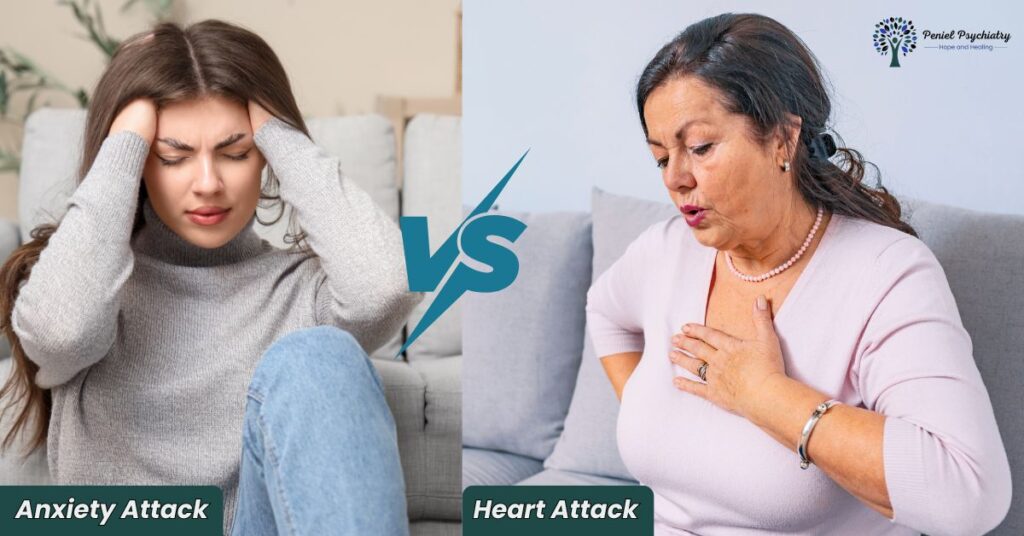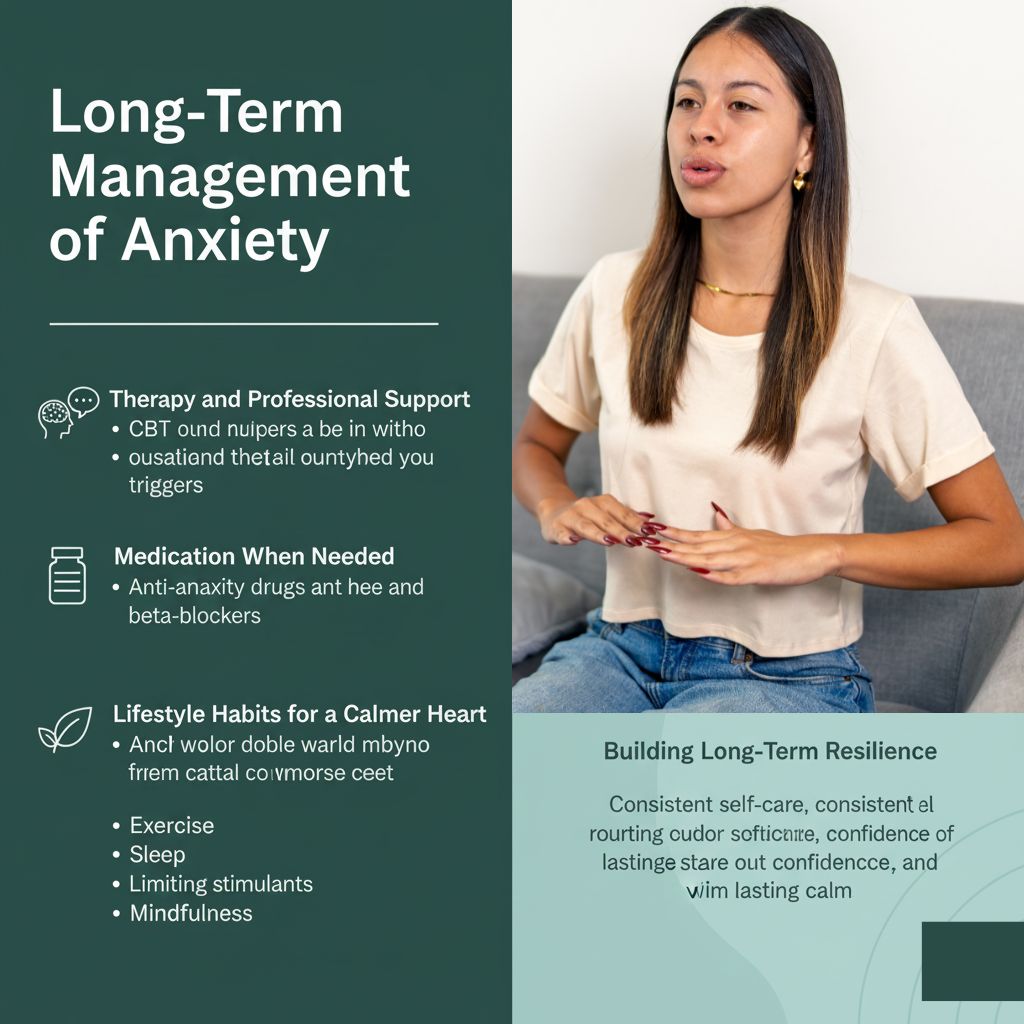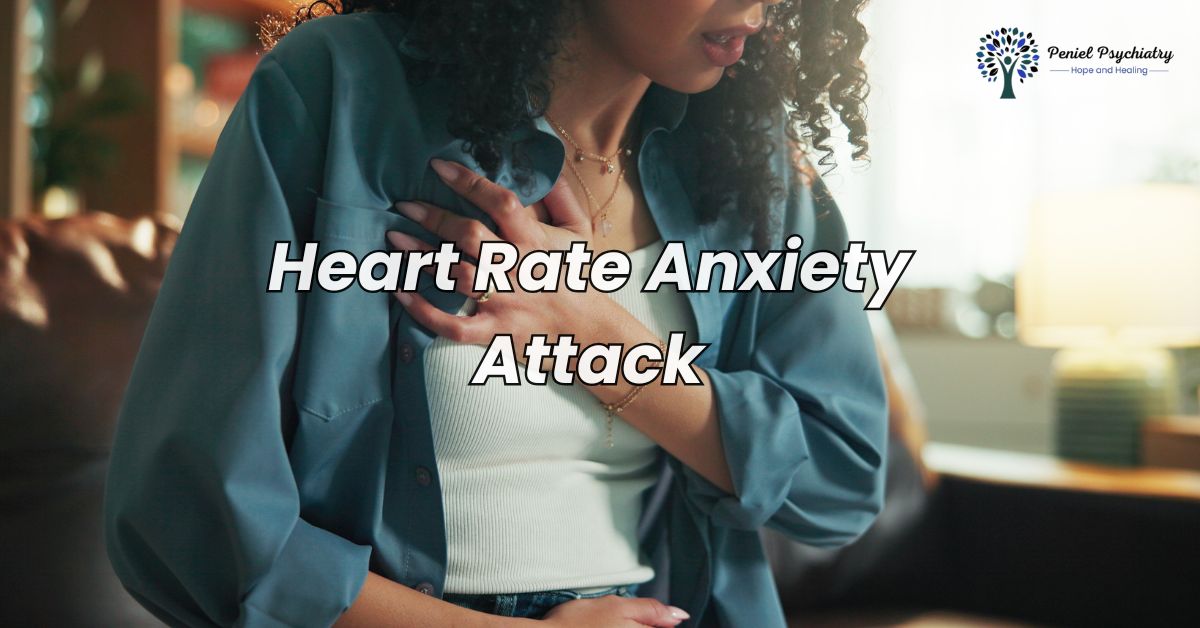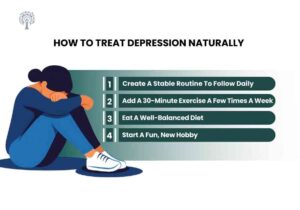A heart rate anxiety attack can be scary. Your heart starts beating fast, and you may feel something is wrong. Many people think they have a heart problem, but it often comes from stress. When you feel anxious, your body releases stress hormones. These chemicals make your heart beat quicker, and your chest feel tight. You might also find it hard to breathe.
These feelings are intense but usually pass within minutes. Knowing how your body reacts can help you stay calm. It also enables you to see the difference between real heart trouble and anxiety. When you understand this link, you can take simple steps to ease your mind and steady your heart.
What Happens During an Anxiety Attack
When an anxiety attack starts, your body reacts quickly. Your heart rate increases, your chest feels tight, and breathing can become difficult. This sudden change happens because your brain senses danger even when there isn’t any real threat. As a result, your body goes into what doctors call the “fight or flight” response.
Why Your Body Reacts This Way
In this state, your body releases stress hormones such as adrenaline and cortisol. These chemicals prepare you to face or escape danger. That’s why the heart rate during an anxiety attack can rise sharply, your body’s natural way of pumping more blood and oxygen to your muscles. This explains why many people notice a strong pulse or fast heartbeat when dealing with heart rate anxiety attacks.
Other common symptoms include trembling, sweating, dizziness, or tingling in the hands and feet. Some also feel chest pain or a tight throat. These sensations often peak within minutes and then fade.
Remember, while a heart rate anxiety attack can feel frightening, it’s not dangerous. It shows your body’s stress response at work, not a heart problem. Understanding this can help you stay calm and recover more quickly when your heartbeat starts to race.
How Anxiety Affects Heart Rate
A racing heart rate during an anxiety attack can feel alarming, but in most cases, it’s the body’s natural reaction to stress. Your heart isn’t weak or damaged; it’s simply responding to signals from your brain that something feels unsafe.
The Body’s Natural Stress Response
When anxiety hits, your brain releases stress hormones like adrenaline and cortisol. These chemicals tell your heart to beat faster and your lungs to draw in more oxygen. This “fight or flight” response prepares your body to handle a threat even when there’s no real danger. That’s why your heart rate anxiety attack episodes can feel so intense.
What You Might Feel
During an anxiety or panic attack, your heart rate may rise to 100–130 beats per minute or higher. You might feel a pounding in your chest or neck, fluttering sensations, skipped beats, or chest tightness. These symptoms usually peak for a few minutes, then fade as your body begins to calm down.
How Your Heart Returns to Normal
As the anxiety passes, hormone levels drop, breathing slows, and blood flow steadies. Your heart rate gradually returns to its normal rhythm. Regular calm breathing, rest, and gentle activity can help keep your heart rate steady even when anxiety appears again.
Understanding how anxiety affects your heart helps you feel less afraid. Once you recognize what’s happening, you can manage each heart rate anxiety attack with more confidence and calm.
Anxiety Attack vs. Heart Attack Key Differences
Anxiety attacks and heart attacks can feel almost the same. Both may cause chest pain, shortness of breath, and a fast heartbeat. But the cause and danger level are very different. Knowing the signs can help you stay calm and react the right way, especially when a heart rate anxiety attack makes your pulse feel out of control.

How the Chest Feels
During a heart attack, the chest pain often feels heavy or crushing. It may spread to your arm, jaw, or back. The pain usually lasts longer and doesn’t fade with rest. In an anxiety attack, the chest pain often feels sharp or tight and can move around. Once the anxious feeling eases, the pain and heart rate anxiety attack symptoms usually calm down too.
Other Symptoms to Notice
Heart attacks can cause cold sweats, nausea, and pain that stays even when you sit or lie down. Anxiety attacks, on the other hand, often bring trembling, dizziness, and a sudden feeling of fear or panic. Your heart rate may spike quickly, but it usually slows when you begin to relax. Tracking your heart rate and anxiety attack patterns can help you notice triggers and manage stress better.
When to Seek Medical Help
It’s not always easy to tell them apart. If you ever feel chest pain with shortness of breath, fainting, or pain that spreads to your arm or jaw, call emergency help immediately. Even if it turns out to be anxiety, it’s always safer to have your heart checked. Understanding these differences and how your heart rate anxiety attacks feel can help you respond faster and with more confidence.
How to Calm Your Heart Rate During Anxiety
When your heart rate spikes during an anxiety attack, it can feel scary, like your body is out of control. But simple, safe steps can help steady your pulse and calm your mind.
Use Breathing to Slow the Heart
Deep breathing is one of the most effective ways to manage a heart rate anxiety attack. Try this: inhale slowly through your nose for four seconds, hold your breath briefly, then exhale through your mouth for six seconds. Repeat this rhythm until your breathing and heartbeat begin to settle. As your body senses safety, your pulse naturally slows down.
Move Gently and Relax the Body
Gentle movement helps release built-up energy and tension. Take a short walk, stretch your arms, or roll your shoulders. These small actions help your body regulate stress hormones that can raise your heart rate. Avoid caffeine or nicotine when anxious, as both can make your heart rate during anxiety attacks climb higher.
Use Calm Thoughts and Grounding Tricks
When panic hits, grounding techniques can help you refocus on the present. Look around and name five things you can see, four you can touch, and three you can hear. This shifts your attention away from your racing heart and reminds your brain that you’re safe.
With steady breathing, gentle movement, and calm thinking, your heart rate during anxiety can return to a natural rhythm, helping you feel more in control.
Long-Term Management of Anxiety
Managing anxiety over time helps your heart stay calmer and your mind clearer. Short-term coping skills are helpful, but lasting relief comes from habits that strengthen both mental and physical health. With regular care, you can reduce panic attacks and prevent sudden spikes in heart rate during an anxiety attack.

Therapy and Professional Support
Cognitive Behavioral Therapy (CBT) remains one of the most effective approaches for anxiety. It helps you recognize triggers, challenge negative thoughts, and respond calmly when anxiety builds. Working with a trained therapist can lessen the intensity of panic attacks and improve how your body reacts. People who experience a heart rate anxiety attack often find therapy helps them stay grounded and manage symptoms better.
Medication When Needed
Sometimes, doctors recommend medication to keep symptoms under control. Anti-anxiety medications or certain antidepressants can balance brain chemicals and reduce frequent panic attacks. In some cases, beta-blockers are prescribed to slow down a racing heartbeat and ease anxiety in high-stress moments. Any medication should always be taken under a doctor’s supervision for safety and effectiveness.
Lifestyle Habits for a Calmer Heart
Daily routines play a significant role in anxiety management. Regular exercise supports heart health and lowers stress. Quality sleep restores balance and reduces emotional strain. Limiting caffeine, nicotine, and other stimulants helps avoid sudden heart rate anxiety attacks. Practicing mindfulness, journaling, and deep breathing can calm both your mind and body. Tracking what triggers your anxiety can help you spot patterns and make better lifestyle choices.
Building Long-Term Resilience
Consistent self-care builds resilience over time. Your body learns to handle stress more smoothly, and your heart becomes less reactive during anxious moments. Gradually, you’ll feel more confident and in control, even when challenges arise. With the right mix of therapy, professional guidance, and healthy habits, you can manage heart rate anxiety attacks and maintain lasting calm.
When to Seek Professional Help
Knowing when a heart rate anxiety attack goes beyond everyday stress is essential. While most rapid heartbeats are linked to anxiety, some symptoms can point to something more serious. Understanding when to seek medical care keeps you safe and helps reduce fear during these moments.
Red Flags to Watch For
Get medical help immediately if you have chest pain that spreads to your arm, jaw, or back. Other warning signs include fainting, severe dizziness, or shortness of breath that doesn’t ease with rest. These symptoms may suggest a heart condition instead of an anxiety-related heart rate spike.
Consulting a Psychiatrist
Even if your heart rate anxiety attack is triggered by stress, talking to a mental health expert can make a big difference. You can learn more about the professional care available at Peniel Psychiatry. A psychiatrist can assess your symptoms, suggest therapy, and recommend safe medication if needed. Ongoing sessions help track progress and prevent future anxiety attacks.
Booking an Appointment
If you often experience racing heart episodes or ongoing anxiety, early support is key. You can easily book an online session with a licensed professional through. Expert guidance ensures you manage your symptoms safely and regain peace of mind.
A heart rate anxiety attack can feel overwhelming, but it is usually a stress response, not a heart problem. Understanding why your heart races, how anxiety affects your body, and learning calming techniques can help you feel more in control.
Long-term management, including therapy, lifestyle changes, and sometimes medication, reduces the frequency and intensity of panic attacks. Tracking triggers, practicing deep breathing, and using grounding exercises can support daily calm.
If you experience repeated racing heart episodes or intense anxiety, seeking professional help is essential. You can connect with Kenny Adedayo for expert care atPeniel Psychiatry. To schedule your session directly, book your appointment here. Early guidance ensures your symptoms are managed safely and effectively.
Frequently Asked Questions for Heart Rate and Anxiety
Is a heart rate of 120 a sign of a panic attack?
A heart rate of 120 beats per minute can happen during a panic or anxiety attack. It is usually your body’s response to stress. This does not always mean a heart problem. If the fast heartbeat comes with chest pain, fainting, or pain spreading to your arm or jaw, seek medical attention immediately.
How much does anxiety raise heart rate?
Anxiety can increase heart rate by 20 to 50 beats per minute or more, depending on the person and the intensity of the stress. During panic attacks, some people may reach 100–130 beats per minute. The increase is temporary and usually decreases once the body calms down.
How to calm a racing heart from anxiety?
Try slow, deep breathing, grounding exercises, or light movement, such as walking or stretching. Splashing cold water on your face and avoiding stimulants like caffeine can help. Focusing on what is safe in the present moment reduces fear and lowers your heart rate naturally.
How to snap out of a panic attack?
Remind yourself that the attack is temporary and not dangerous. Focus on controlled breathing or counting things around you. Grounding techniques, like noticing five things you see and four things you feel, help redirect your mind. Gentle movement can also release tension.
Can anxiety cause a permanent high heart rate?
No, anxiety does not usually cause a long-term high heart rate. Most spikes are temporary responses to stress. Regular relaxation practices, therapy, and healthy habits reduce the frequency of these episodes. A doctor should still check a persistent fast heart rate.
When should I see a doctor for anxiety-related heart symptoms?
Seek help if your heart rate stays very high, or if you experience chest pain, shortness of breath, or dizziness. Even if it turns out to be anxiety, a professional like Kenny Adedayo can guide you safely. You can book your appointment here.




